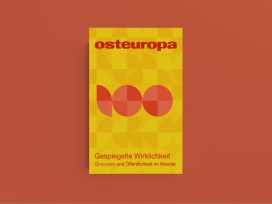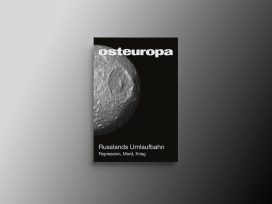Abstracts Osteuropa 10/2005
Silvia von Steinsdorff
Good and bad informality? Informal politics in the West and in the East
Informal processes play a key role in politics. The bandwidth reaches from work in constitutionally unforeseen advisory commissions and corruption to mafia-like practices. Informality occurs wherever formal institutions reveal a deficit in performance. Whether informal practices are functional or dysfunctional for boosting the formal institutions’ efficiency is controversial and depends on the measure applied. Often, the measure is liberal democracy based on rule of law. Informal practices in central and eastern Europe have their own character. They feed on the legacy of centralized socialism and the side effects of the transformation process. The concept of legitimacy, so far neglected, offers a means of analyzing and assessing informal politics in the East.
Astrid Lorenz
Present and decentralized. Informal politics in the Federal Republic of Germany
The centralized informal politics of Adenauer’s Federal Republic have evolved into modern Germany’s present-day decentralized informality. Informal relations may partially endanger democratic principles, but they are a means of facilitating political decisions in consensual, pluralistic, media-saturated systems such as Germany. With regard to the effects of such informal political structures, it seems important that social, economic, and media pluralism as well as strong parties are able to function as a corrective to this asymmetric exercise of power.
Rafael Mrowczynski
Gordian knots. Administrative hierarchies and networks in the Soviet Union
The phenomena of post-socialist informality, such as the shadow economy, clientelism, and corruption, resulted from the specific structures and means of functioning that arose in socialist socialization. Analysis of the Soviet Union shows that socialist society functioned along the lines of a decentralized centralization of economic and social activities. This emerged as unofficial networks of relations within the complex hierarchies of the party-state apparatus formed. The increasing independence of these structures of interaction vis-à-vis the centre was a decisive factor in the collapse of the socialist social order.
Gerd Meyer
Ambivalent factors of personalized politics in Poland
Politics can be personalized in many ways. The effects of personalization in a democracy are accordingly ambivalent. The personalization of politics can mean the behaviour of the political elite, the presentation of political content in the media, the perception of politics by citizens and, finally, clientele politics. In Poland, many politicians use their office for personal gain or go around formal democratic practices so as to maintain their power. On the other hand, President Aleksander Kwasniewski was able to use the prominence of his office and his person to integrate forces that were drifting apart, to bring more stability to Polish politics, and to create future prospects for the country.
Kerstin Zimmer
Clientelism in the neo-patrimonial state. Strategies for securing regional power in Ukraine
Informal rules and practices are omnipresent in Ukrainian politics. Because private life and public office are hardly separated, resources within the state apparatus are abused to power-political ends. This is especially seen in relations between the centre and Ukraine’s regions. Control of the Ukrainian regions is secured by the blurring of appointments and budgeting politics on the one hand with elections on the other. Regional politics is a system of redistribution in which the lower levels are formally and informally dependent on the centre and forced to cooperate in clientele form. The return of favours from the centre depends on the successful mobilization of the electorate during elections.
Vadim Volkov
Beyond the courtroom. Why the law does not function the way it should
The collapse of the Soviet Union created a legal vacuum in Russia. Violence-prone
enterprises competed with the state to protect newly created property. Sovereign
duties of state such as drafting and implementing laws were commercialized and
replaced by common law and the threat of violence. Only at the end of the 1990s did
the judiciary regain any meaning. However, that is less the expression of a
strengthening of rule of law than the fact that the court system now serves as a
means for a new redistribution of property. The Yukos case is an illustration of this.
An independent judiciary capable of functioning has yet to develop in Russia.
Vladimir Gel’man
Elections à la Russe. Formal establishment of rules and informal methods
Elections take place in Russia. A presidential decree and the election law of 1994
created the basis for them. Numerous rules regulate the registration and
financing of candidates, the election campaign, and the holding of the vote itself. At
the same time, there have emerged informal practices that get around the formal
election rules and present effective mechanisms for influencing the outcome of a
vote. These informal practices can increase political stability, but they could also
lead to its collapse. The question whether elections can produce a handover of
power in Russia remains open.
Heiko Pleines
Democracy and the informal exertion of influence. Economic actors in Russia and Ukraine
This contribution analyzes and compares the forms and consequences of the informal influence exerted on Russian and Ukrainian politics by economic actors. The
relevant economic actors and their strategies for pursuing their interests are depicted for the presidencies of Boris Yel’tsin, Vladimir Putin, Leonid Kuchma, and
Viktor Yushchenko. This is followed by a discussion of the consequences that this
has for the economic and political development of these two countries. Finally, the
author examines whether the results depend on cultural factors and whether they
are relevant for the longer term.
Barbara Lehmbruch
The state, the market, and the shadow economy. Survival strategies of Russian state institutions
The public and private spheres in Russia are inadequately separated. This goes for
private entrepreneurs and the state. Many government agencies are commercially
active outside their government office. This was revealed in a study of Russian
forestry. The consequences are mixed. Hybrid administration facilitates the misappropriation of public resources for private ends. The source of such practices lies in
institutions’ struggle for survival. Hybrid agencies are corrupting Russia’s market
economy; however, in many fields of activity, they contribute to making it possible for
the state to fulfil its duties.
Tina Olteanu
Loss of trust. Corruption and democracy in eastern Europe
In eastern Europe, many citizens perceive central state institutions and providers of
public services as corrupt. It is widely assumed that office bearers, parliamentarians,
civil servants, and employees doggedly pursue their own interests. This, however,
does not inevitably lead to a lack of faith in these institutions. Likewise, there is no
evidence that corruption is a socially accepted phenomenon in eastern Europe.
Kai-Olaf Lang
On the way to the Fourth Republic? The parliamentary elections in Poland, 25 September 2005
The conservative forces of the parties Law and Justice and Civic Platform emerged as
the clear winners in Poland’s parliamentary elections. The governing United Democratic Left, by contrast, lost three-fourths of its voters. With that, the Polish party system still remains only rudimentarily stable. Law and Justice and Civic Platform have
announced their intention to form the next government, but tensions between national-conservative, statist, and Euro-sceptical Law and Justice and bourgeois-liberal Civic Platform are starting to show. Law and Justice will be able to realize its
project of a Fourth Republic only in moderated form – if at all.
Janusz Rolicki
Poland at a turning point. Reflections of a political man
Poland’s general election on 25 September 2005 marks a turning point for the
country. Its political landscape is on the verge of undergoing long-lasting changes.
The victory for the parties Law and Justice and Civic Platform, both of which lay
claim to the Solidarnosc legacy, fed on the disappointment in the results of transformation and in the failure of the post-communists, whose support collapsed in the
maelstrom of numerous corruption affairs. The winners, the brothers Kaczynski and
their followers, see this success as the first step in reshaping the republic: Their goal
is to strengthen the presidency at the expense of parliament. Whether they succeed
depends on the results of the presidential election later this autumn.
Michal Witkowski
The cultural divide. Reflections of an unpolitical man
Polish society is culturally deeply divided. The liberal left, which cherishes emancipation and permissiveness, is not even represented politically. The post-communist
Left, so soundly defeated in the election, was also anything but liberal. By contrast,
the national-catholic Right is trying to force its prude morals on society as a whole
and equates homosexual love with paedophilia. This camp has triumphed in the
parliamentary election. The adherents to liberal values face difficult times ahead.
Published 15 November 2005
Original in German
Contributed by Osteuropa © Osteuropa
PDF/PRINTNewsletter
Subscribe to know what’s worth thinking about.



